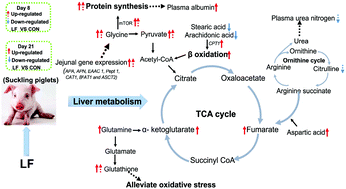Metabolomic profiling reveals the effects of early-life lactoferrin intervention on protein synthesis, energy production and antioxidative capacity in the liver of suckling piglets†
Abstract
This study aimed to determine the effects of an early-life lactoferrin (LF) intervention on liver metabolism in suckling piglets. Sixty newborn piglets with an average initial body weight (BW) of 1.51 ± 0.05 kg were assigned to a control (CON) group and an LF group. At age 1 to 7 days, the piglets in the LF group were orally administered LF solution (0.5 g per kg BW daily), whereas the piglets in the CON group were orally administered the same dose of physiological saline. Plasma, jejunum and liver samples were collected on days 8 and 21. The LF piglets showed a decreased plasma urea nitrogen level on day 8 and an increased plasma albumin level on day 21. Pathway analysis of the metabolomic profiles showed that the LF treatment affected amino acid metabolism in the liver. In addition, the LF treatment upregulated the gene expression levels of proteolytic enzymes and amino acid transporters (APA, APN, EAAC1, Pept1, CAT1, B0AT1 and ASCT2) in the jejunum, and it enhanced the phosphorylation levels of mTOR and p70S6K in the liver. The LF treatment also upregulated the expression of a β-oxidation-related gene (CPT1) and affected the tricarboxylic acid cycle in the liver on day 21. Furthermore, the LF piglets showed a decreased level of malondialdehyde and increased levels of GSH, GSH-Px and GCLC in the liver mitochondria. Overall, the early-life LF intervention affected the protein synthesis, energy production and antioxidative capacity in the liver of the neonatal piglets.



 Please wait while we load your content...
Please wait while we load your content...